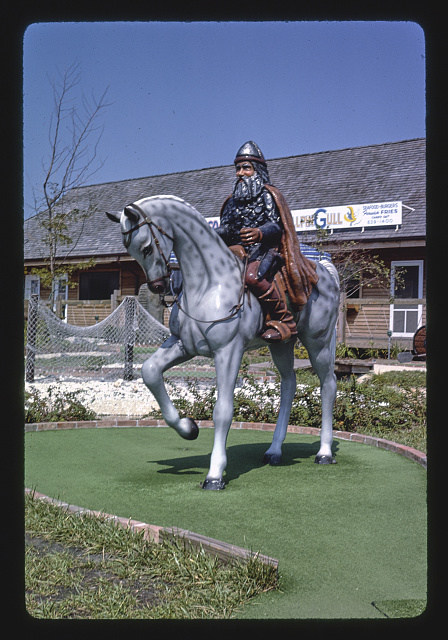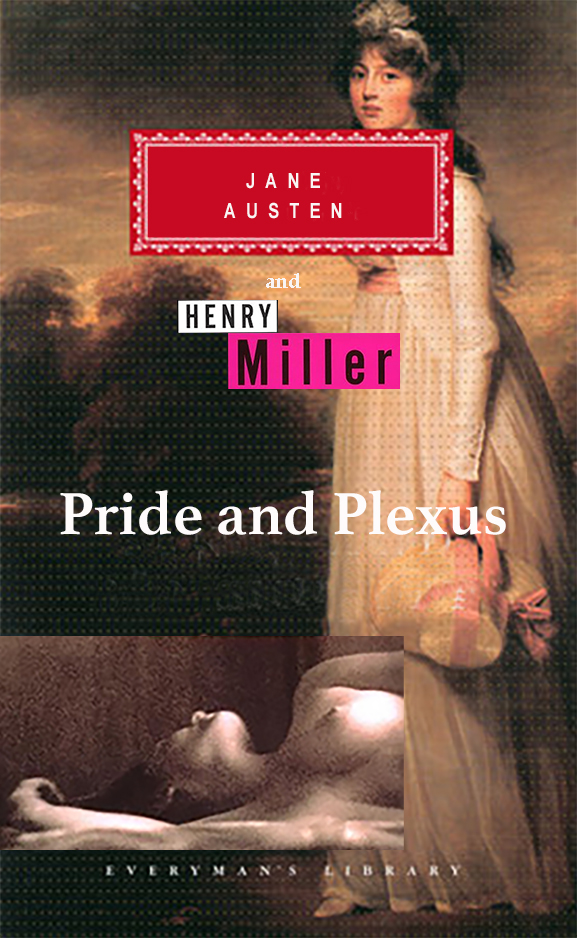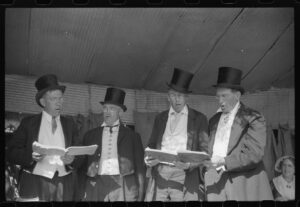A manuscript discovered in a London attic in 2016 confirmed the long rumored literary collaboration between Jane Austen and Henry Miller. After the resolution of legal disputes between the heirs of the Austen and Miller estates, the work is finally to be published this year. Dangerous Neighbors presents an exclusive excerpt published for the very first time of Pride and Plexus.
It is a truth universally acknowledged that a single man in possession of a good fortune must be in want of some action. Thus it was that Mrs. Bennet prevailed upon Mr. Bennet to invite Mr. Bingley, the new resident of Netherfield Park and recent winner of the most eligible bachelor poll in the Arrogant Aristocrat, to dinner, hoping that one of her daughters would catch the young gentleman’s eye and one day become Mrs. Bingley.
Naturally, she was disconcerted when an answer arrived from Mr. Bingley to the effect that he was obliged to be in London on account of a very important puppet show and therefore could not attend. Lady Lucas put Mrs. Bennet’s fears to rest, however, assuring her that while Mr. Bingley was perhaps exceedingly keen on puppet shows for a grown man, he still had a lot of money and that he was also probably planning to attend the upcoming ball where her daughters would have the opportunity to meet him.
When Mr. Bingley’s party entered the assembly room at the ball, it possessed six people: himself, his two sisters, the elder sister’s husband, his friend Mr. Darcy, a handsome but somewhat dour young man, and an odd, fortyish bald man of unwholesome disposition wearing peculiar round spectacles who straggled in behind the group and brazenly eyed the women in the room as he went.
Bingley, good-looking and of pleasant disposition, soon acquainted himself with everyone in the room. He was friendly and courteous, danced every dance, and apart from a strange habit of periodically holding his nose with his fingers and pretending to plunge under water as he danced, made a favorable impression on everyone.
Bingley also possessed an acute social sensitivity, so when he noticed several of the Bennet women grumbling to one another and looking angrily toward one corner of the room, he assumed that his friend Mr. Darcy, who was often somewhat aloof, was being his usual self. He approached his friend, who was leaning over the table and helping himself to hors d’oeuvres.
“Come, Darcy,” he said, “you must dance a number or two.”
Bingley was startled when the man leaning over the table turned around and looked at him. It was not Mr. Darcy, but rather the odd, fortyish bald man with the strange round glasses. He was vigorously masticating a cracker with a slice of ham on it, a large pink shred of meat hanging out the side of his mouth.
“Darcy took a powder,” the man mumbled, wiping some crumbs off his chest with his hand.
His face flushed with indignation, Bingley queried, “May I inquire as to who you are and precisely what you are doing here?”
“Keep your pants on, Bingy,” the man replied with a heavy Brooklyn accent. “It’s me, Henry.”
Flabbergasted, Bingley shot back, “I had no intention whatsoever of removing my trousers, sir, nor have I had any occasion to make the acquaintance of any Henrys. Furthermore, I should be very glad if you refrained from referring to me as ‘Bingy.'”
“Miller. Henry Miller. Don’t you remember, Bingy? Last summer on the Champs Elysees? You loaned me a few francs. We had some drinks. Talked some literature. You said if I was ever in England, I should–“
“Mr. Miller,” Bingley began, trying to keep his voice down so as not to attract attention,” even supposing what you say is true, this is hardly the time–“
“I went to your estate–quite a joint by the way–and your maid told me about the ball. I thought I’d come down, get a meal under my belt, make a touch and maybe tear off a piece, what? But all I’ve seen so far are these upper crust English bitches. And that pal of yours…Darcy. He’s a bad egg that one is, rotten clean through. He has all the charm of a boa constrictor. I told him to beat it.”
By this time Bingley was in a perfect rage, and was at pains to maintain his composure. “Now see here, Mr. Miller,” he sputtered,” I must tell you that your behavior and language are entirely insupportable and to be frank, perfectly horrid. You barge in here quite uninvited, help yourself to refreshments, insult my friend and offend the ladies in attendance with your vulgarity. Furthermore, your presence in this century and literary genre are not only impossible, but wholly inappropriate.
“I could say something about a time warp,” Miller shrugged, “but who’d buy it?”
“I am afraid I shall have to ask you to leave,” Bingley pronounced gravely.
“You didn’t think my presence was so inappropriate last summer when you were touring the Parisian whorehouse circuit with my consultation, did you?” Miller asked, cracking a wry smile.
“I was young and foolish, and I have since paid the price for it.”
“Ah, a little touch of the syph’ now and again is good for you,” Miller remarked, slapping Bingley on the back.
Just then Elizabeth Bennet, who had been sitting nearby, approached the two men.
“What’s all this about the syph’ then?” she inquired, her lovely, intelligent eyes on Bingley.
“Oh, uh, no, you misunderstood, Elizabeth,” Bingley stammered. “Mr. Miller noticed me sniffling and he said, uh, ‘a touch of the sniffles now and again is good for one.'”
“Bingy here’s got himself a nasty dose of the syph’,” Miller chimed in with a feigned look of concern on his face. “He looks fine on the outside, but underneath he’s like one of those health textbook photographs.”
“That’s not true, Elizabeth,” Bingley blurted out in a panic. “The chancres have all healed.” Bingley abruptly covered his mouth and his eyes were agape with horror and humiliation. “I…I…if you’ll excuse me,” he mumbled, his body seeming to shrink as he stumbled away.
Her eyes flashing with anger, Elizabeth turned on Miller. “Now see here. I don’t know who you are, sir, but your behavior is beastly–“
“The name’s Miller,” he cut in. “Will you excuse me for a moment while I assume the narrative? I can’t operate in this kind of prose…You understand.”
Having filled my belly with those lousy English hors d’oeuvres and made short shrift of that sanctimonious prick Bingley, I set about tackling Elizabeth Bennet, a tall order considering the ugly scene I had just created. She was no dumb tart, I could see that at a glance. I knew I’d have to do some pretty fast talking. She was standing there glaring at me with that unparalleled English indignation, but underneath it, I knew there was a sultry wench just waiting to have her ticket to the Land of Fuck punched. It hit me on the spot that the only thing to do was come at her from the sincerity angle, spill my guts as it were, make a clean breast of it.
“Listen,” I began, “I don’t have to tell you that I’m a worthless bastard. I can see that you’re pretty good at sizing people up. There’s no nobility in this mug, and there’s no family fortune or name behind me. I’m bald, obnoxious, penniless, and the critics think I’m a pervert. A lot of broads would be turned off, but I can see that you’re different.”
“I’m turned off,” she said without batting an eye.
“Surely you can’t find me less appealing than that Darcy stiff,” I replied.
“While Mr. Darcy is admittedly in want of social graces, he does possess rather pert buttocks.”
“True,” I conceded.
“And he has an enormous estate which is rumored to have at least two ping pong tables so there’s never any waiting.”
“That’s tough to pass up,” I let slip, nearly losing my grip on the situation. But I was not about to lose a first class piece of tail like Elizabeth Bennet to a couple of ping pong tables. “Listen, I hate to have to call your attention to this, but don’t you notice a certain…joie de vivre about me?”
“What?”
“It’s French.”
“I know–I just never heard it with a Brooklyn accent before.”
“You see, it’s my belief that the guy with the fewest needs is the best off. Take myself for example. I have no money, no resources, no hopes. I’m the happiest man alive…except when I want to order a pizza. But you see my point. Most people spend their whole lives in lockstep with the death machine, preoccupied with petty concerns like food and shelter. Personally, I am much more interested in roaming Europe with a perpetual hard-on and a bottle of Pernod, a cockamamie Columbus in reverse, exploring the fucked-out, extinct crater of Western Civilization while Oswald Spengler dances the dance of death beneath a firmament sagging with blackened stars and filthy angel-whores crawling with crabs. Sounds juvenile, I know, but the great ones have often had to take strange detours in their journey to the self. Christ, Buddha, Gandhi, Dostoyevsky, Jack Dempsey–who knows what sort of cockeyed stunts they pulled on their way to enlightenment? Not that I’m comparing myself to those birds, mind you. No, I’m just a Brooklyn boy and maybe the last true genius to have the sense to step off that monstrous, steaming turd of a country called America and decamp for the jocose fecundity of Paris. My point is that while I don’t have a pot to piss in, I’m a millionaire in spirit. I have a lot of joy, Elizabeth, and I’d like to share some with you, preferably in a quiet, discreet location, but any available space will do. With me you’ll feel as light as a corpse floating in the Dead Sea. No, I can’t promise you limitless ping pong, but I will take you around the world, and when I’m done with you, lassie, you’ll be a real woman! Perhaps you think my overture too crude, but you know, the French have a saying. Le tabaciste a sali son pantalon. Beautiful, isn’t it? It means “the tobacconist has soiled his trousers” or something like that…Its presence significance escapes me, but it’s one of the few things I understood down there. Did I mention that I’m a surrealist?…Oh, let’s stop toying with one another, Elizabeth. From the moment I saw you, I fell for you like a condemned man dropping through the gallows trap door. I knew that I’d never be satisfied until we were fused like a couple of love sick amino acids, humping and thrashing about in the primeval soup. The world is a slaughterhouse, Elizabeth, and if we can dodge the flailing cleavers long enough to make a little whoopee amidst the gore, then what the hell! I realize this may not be your idea of a romantic courtship, but you’ll get past that tripe. You’ll soon see that in this world it’s fuck or be fucked and the Devil take the hindmost. And yet life becomes beautiful when we say ‘yes’ to its indignities and injustice, yes to humiliation and deprivation, yes to the gobs of spittle rained down on us by the hordes of sneering Judases who live only to crush our feeble life force and refuse our perfectly reasonable requests for a little pin money. Aye, we must take a blind leap into the dark, we must hurl ourselves headlong into the stream of life, though it be a putrid river of vomit, blood, semen, bile, absinthe, camphor balls and Pepto-bismol coursing through the filthy gutter of existence. Aye, we must plunge into the crepuscular melange of mad generals, beguiling taxi dancers, monochrome businessmen, bedraggled vaudeville performers, lesbian nuns, and the red-haired albinos of the Zuni region. Aye, we must say yes with our loins, Elizabeth, yes to the blood surging in our groins! What is it the French say, Cherie? La tabaciste a sali son pantalon!“
Throughout my impassioned plea, Elizabeth’s expression had wavered somewhere between revulsion, fear and hatred. Clearly she was intrigued. Although I think I struck a couple of wrong notes, my seductive use of French had apparently stripped her of her defenses. Now was the time to make my move. I embraced her suddenly and–in a flash my arm was locked in a vice-like grip, and I found myself whirling through space like a rag doll caught on a propeller. I hit the parquet floor just as suddenly, and a blinding pain shot up my back and head.
Standing over me, poised and ready to strike, was a snarling Elizabeth Bennet. “Have you been studying judo long?” I asked casually, as though the textbook perfect, highlight film quality flip she had just executed was nothing more than a simple misunderstanding. In response she shrieked, wheeled around, and with a devastating, lightning-quick side kick, split a cinder block held up by a butler who appeared out of nowhere. “Oh, karate,” I marveled. “And in a hoop skirt too. Very impressive. Listen, you’ve got me all wrong…”
The next thing I knew, she was expertly handling a pair of coal black nunchucks, a dizzying blur of terror crazily encircling her as she let loose a war cry that would have sent chills down Bruce Lee’s spine. I sprang up in spite of the pain in my back and lit out of there like a motherfucker, making sure to worm a little carfare out of the butler as I left. “Christ,” I said to myself, “who’d have thought these late 18th century era trollops knew fucking kung fu?
Copyright, Bill Burman 2020









